Process takes on plastic recycling challenge by turning food packing into heat conducting and electromagnetic shielding material

A new recycling process for low-grade packaging plastics promises to produce high quality technical materials. If commercialised, this could make plastic recycling more economically attractive and reduce plastic pollution.
Multilayer packaging is an excellent barrier to oxygen and moisture, making it an ideal material for food packaging. It can contain a range of polymers such as polyethylene, polyamide and ethylene vinyl alcohol, so is difficult to recycle into anything of value – much of the associated waste is incinerated or sent to landfill.
Shibing Bai and his team at Sichuan University in China are specialists in recycling plastics. They have come up with a simple, scalable and economically viable way to recycle multilayer plastic packaging. First, they grind the plastic into a fine powder using a technique known as solid-state shear milling, before mixing it with expanded graphite and compression moulding into a flat sheet. The resulting material has good electromagnetic shielding properties and efficiently conducts heat in one direction. This makes these composite materials suitable for a range of high tech electronic applications, where electromagnetic shielding of wires and components is required in addition to thermal management.
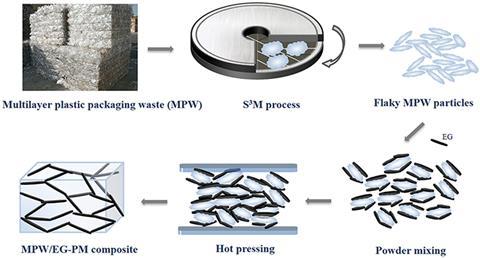
‘The expanded graphite provides the thermal conductivity and the electromagnetic shielding properties, but over 60% of the composite is the polymer matrix recycled from multilayer plastic films which provides the mechanical strength,’ explains Bai.
Andrew Dove, an expert in polymer degradation and recycling at the University of Birmingham, UK, thinks the work is promising. ‘Tackling plastic waste is a big challenge. This is a nice step towards creating an added-value plastics economy, obtaining higher value materials by upcycling plastic waste.’
‘Our next step is to develop our technology for industrial applications,’ says Bai. ‘We believe that with the design of added-value composites like this, recycling rates for plastic packaging will soon be much higher than today.’
References
This article is free to access until 13 December 2018
S Yang et al, J. Mater. Chem. C, 2018, 6, 11209 (DOI: 10.1039/c8tc02840k)


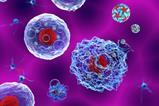
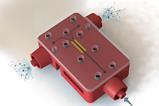
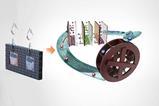
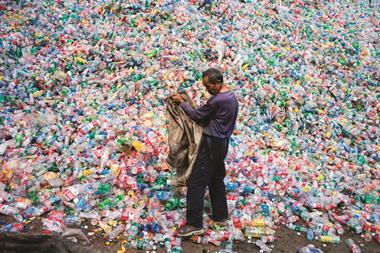











1 Reader's comment